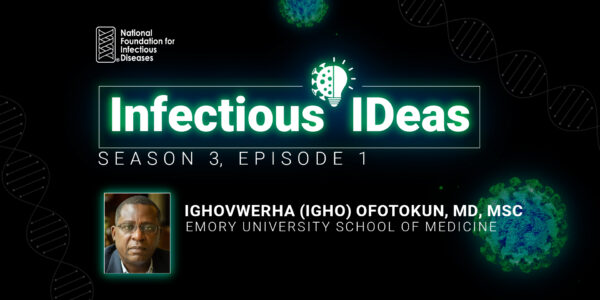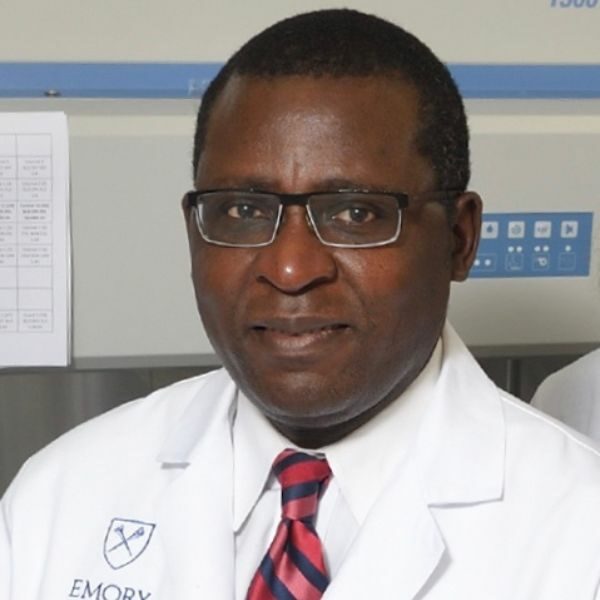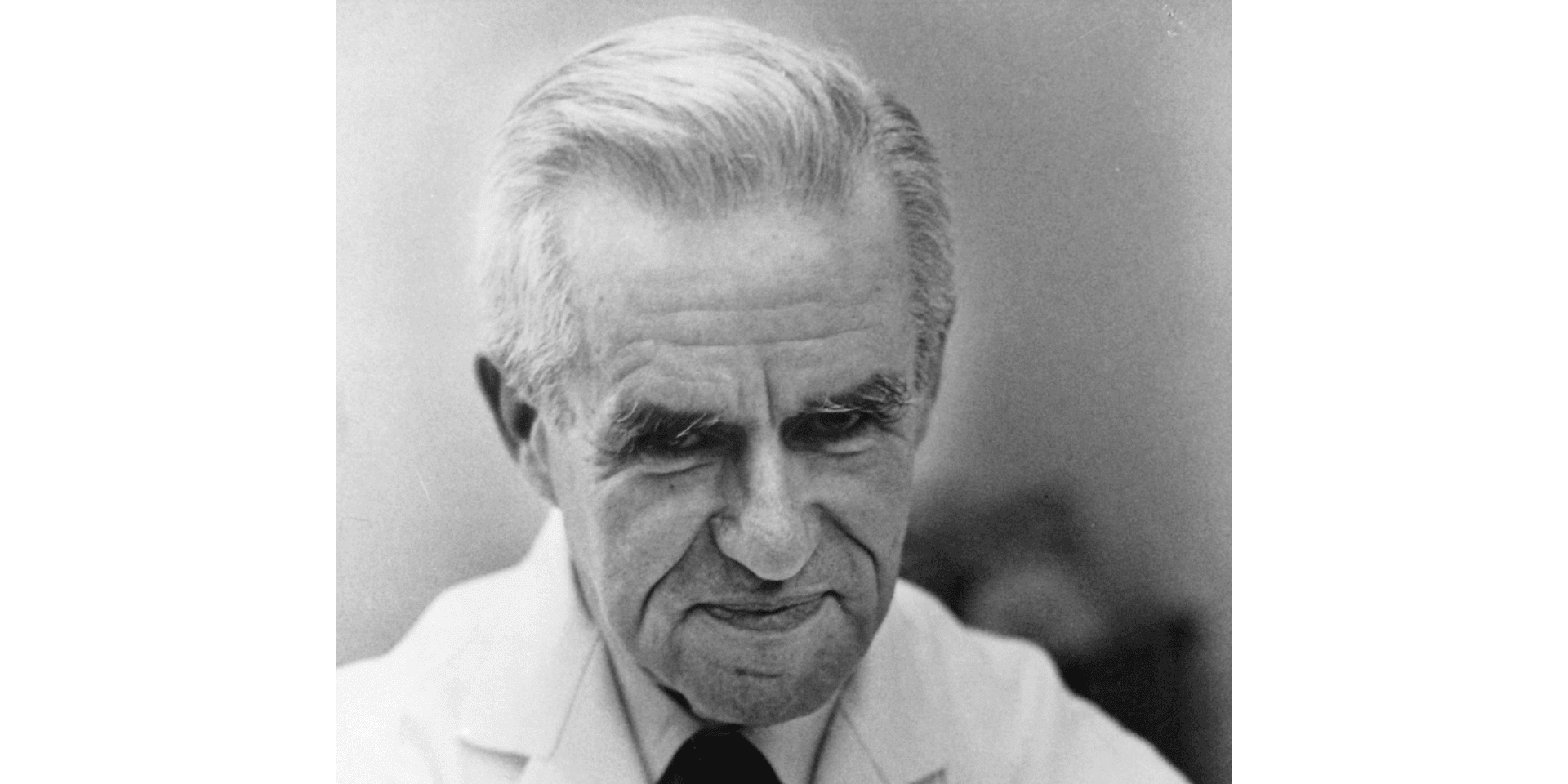The Maxwell Finland Award for Scientific Achievement honors scientists who have made outstanding contributions to the understanding of infectious diseases and public health.
Ighovwerha (Igho) Ofotokun, MD, MSc, of Emory University School of Medicine, received the 2024 Maxwell Finland Award for Scientific Achievement in recognition of an exceptionally productive career devoted to addressing systemic inequities in research, promoting women’s health, nurturing a global research program targeting the prevention and treatment of disease, and mentoring the next generation of HIV clinical and translational researchers.
An internationally renowned clinician-scientist, Ofotokun has long studied the threat that age-related comorbidities pose to healthy aging in people living with HIV, including the pathogenesis of HIV-induced end-organ damage. Findings from his research have led to the revision of HIV standard-of-care treatment guidelines in the US and, internationally, to World Health Organization policy changes that now prioritize antiretroviral regimens that are less risky for women. He has also expanded the visibility and representation of women and minorities in biomedical research and leveraged his expertise and influence to promote research education and training in the US and several other countries including Nigeria, Ethiopia, Georgia, and Vietnam. “He is an outstanding academic leader and researcher, a truly exceptional mentor, a respected clinician, and a valuable addition to an increasingly diverse, equitable, and inclusive workforce in infectious diseases,” said Kathryn M. Edwards, MD, of Vanderbilt University School of Medicine, in nominating Ofotokun.
Tribute Video
Acceptance Speech
An Interview with Igho Ofotokun
What is your greatest professional accomplishment?
Looking back on what I love about the practice of infectious diseases, I have come to appreciate the beauty of “how it all came together.” I started as a clinician with a passion for teaching and nurturing the next generation, and a strong desire and curiosity to understand the biology of the diseases I see by the bedside among my patients. It was this passion that fueled our translational research efforts on the burden and pathobiology of aging-related comorbidities in vulnerable populations of people living with HIV, including women and underrepresented minority populations. Through this work, we developed an elaborate clinical and translational research infrastructure that has enabled us to contribute to the advancement of the field and to train and mentor the next generation of HIV researchers in the US and globally.
I am particularly proud that our work has drawn attention to populations at the margins of society and the health challenges they face when few were paying attention to their health issues. As an example, the workhorse of HIV therapy used to include antiretroviral regimens that were associated with the risk of birth defects or stigmatizing changes in skin color that were unacceptable for many women. We initiated the AIDS Clinical Trials Group (ACTG) 5257 trial that tested an antiretroviral regimen that would be more conducive to women of childbearing age living with HIV. The robust racial and gender diversity of the study population allowed us to examine the impact of these factors on various outcomes. It was heartening to see publications from this work cited in several policy documents, influencing the US Department of Health and Human Services and World Health Organization antiretroviral treatment guidelines for people living with HIV.
What is the greatest challenge you have faced in your career?
Overcoming my self-doubt. As an immigrant from a resource-limited country who came to the US as an adult after completing my medical school training, I thought for some strange reason that all my peers and colleagues were much better than I was. I struggled with this crippling thought for a long time, until I realized that we are all better than someone else in some things and less in others.
The real question is not whether you are better or less than someone else–but what can you uniquely contribute? Although our backgrounds and life experiences are different, we each possess a unique level of giftedness to impact our world. This realization was liberating—knowing that all along I had all that I needed to contribute and positively shape the field of infectious diseases and HIV medicine. I became increasingly aware of my ability to foster collaborations and take on complex clinical and translation research projects that would be difficult for an individual researcher alone. This awareness and self-confidence spurred lasting professional collaborations that brought together expertise in basic and data science, immunology, cardiovascular and neuro-behavioral science, epidemiology, and clinical and translational research to define the burden of non-AIDS aging-related comorbidities and unravel the pathobiology underlying these conditions, exploring risks by sex and other clinical and demographic characteristics, and testing novel therapeutic modalities for prevention and treatment.
Describe a situation that has had a profound impact on you to this day
One experience that stands out was during my posting as a young medical officer in the Niger Delta of Nigeria in the 1990s, at the peak of the AIDS epidemic. HIV medical care during this period in most parts of Africa was rudimentary, there was limited diagnostic capacity, we relied on our clinical skills for case identification, and intervention was limited to the treatment of opportunistic infections.
The epidemic was enshrouded in strong social stigma across the continent, antiretroviral therapy was non-existent, and death following an AIDS diagnosis was almost certain. Few men sought medical care for fear of the stigma of having HIV, but women came seeking care because they wanted to live for their children and their families. Many, however, succumbed, leaving behind orphaned children and widowed husbands. I can still recall their faces, the fear, the anxiety, and the hopelessness. This experience piqued my interest in HIV medicine and women’s health. It was formative in the evolution of my career.
Who or what inspired you to work in infectious diseases?
It is said that the science of medicine is taught, and the art of medicine is modeled. I have been fortunate to have had several great professional role models. One, however, left an indelible mark that continues to influence my practice of medicine. I first met Francis Collins, MD, PhD, (immediate past director of the National Institutes of Health) as a junior physician more than 30 years ago at a small mission hospital in the rural Niger Delta of Nigeria. I was serving as a medical officer and he was a visiting physician, covering the internal medicine service. We knew very little about each other’s background. I rounded with him each morning on the adult patients, and in the afternoons, we ran the medicine outpatient clinic together. He was a great attending physician, and I learned a lot from him during our brief time together.
Near the end of his stay, I witnessed an event that has remained a reference point in my moral compass. We were in clinic together on a hot tropical afternoon when one of the local patients, an elderly disheveled and moribund man was wheeled in. Not long after he arrived, his condition worsened, and he went into respiratory arrest in the crowed clinic. There was no crash cart nearby, no mouthpiece nor amble bag. Things became chaotic and there was confusion and screaming. What I witnessed next in the mix of the confusion would completely change my outlook. Collins was down on his knees, performing mouth-to-mouth resuscitation without a mouthpiece on this dying, unkempt African man. This went on for several minutes before the sick man eventually died. The crowd was stunned at the scene of this White physician down on his knees fighting to save the life of a Black patient he never met before. Later in the day, Collins asked me if I thought the man had HIV or any other contagious infection. I will never forget that day—I saw true compassion in action, I saw the art of medicine modeled. What I saw changed my perspective and made me a better person and a more caring physician—it defined my approach to the practice of medicine forever.
What are the greatest threats and opportunities for the profession?
Not too long ago, it was predicted that infectious diseases as a specialty would become obsolete. Due to advances in modern medicine, new discoveries in infection control and prevention, and the development of potent anti-infective agents, most, if not all, human infections would be eradicated. Nothing could be further from the truth. The past 2 decades have witnessed an unprecedented rise in infectious disease outbreaks, including anthrax, severe acute respiratory syndrome (SARS), avian influenza, pandemic H1N1, Middle East Respiratory Syndrome (MERS), Ebola, Zika, SARS-CoV-2, and mpox. These outbreaks have been superimposed on a pre-existing and substantial baseline of global epidemics including HIV/AIDS, tuberculosis, malaria, and the growing threat of antimicrobial resistance. Infectious diseases continue to be a leading cause of morbidity and mortality, accounting for 25% of all deaths globally. There is increasing recognition that for many infections, the damage to the body lingers beyond the acute phase and persists into a post-acute phase that may be associated with triggering life-threatening medical conditions such as autoimmunity, diabetes, cancer, and neuro-psychiatric disorders.
This a good time to think of infectious diseases as a career. It is a dynamic specialty that challenges one’s intellectual curiosity. One of the greatest challenges for the infectious diseases specialty is that of limited capacity and the need for versatility.
What are the greatest changes you have seen since you began your career?
I thought the HIV/AIDS epidemic with its devastation and increased susceptibilities to other opportunistic infections such as TB, malaria, and viral hepatitis was going to be the greatest infectious challenge of our lifetime. Then came the COVID-19 pandemic. On several occasions early in the pandemic, I feared what would happen if it took years or even decades to find an effective treatment and vaccine. These thoughts were scary, and thank goodness, the vaccines and therapies came as rapidly as they did. I hope that among the lessons learned from the pandemic is preparedness for emerging infectious diseases at the local, national, and global levels.
Knowing what you know now, what, if anything, would you do differently?
I would still choose infectious diseases, HIV medicine, and the focus on women’s health, research education, and fostering career development for the next generation. I took this professional path at a time when it was not popular and the remuneration was among the least of medicine specialties. I was driven by the desire to do good and to make a difference in the lives of the communities I cared about.
Looking back at my career, my choice gave me all the opportunities I needed to fulfill my desires and career ambitions. The challenges and the sacrifices were worth it. In my professional lifetime, a devastating epidemic that was decimating lives and destroying communities across the global was turned into a manageable chronic infection in which life expectancy now approaches normal. Today, the cure for HIV is no longer an elusive goal. I never thought I would be where I am today when I decided to pursue infectious diseases close to 3 decades ago. The prize by far outweighed the sacrifices—no regrets at all.
What is your advice for the next generation of infectious disease professionals?
Infectious diseases as a specialty is more exciting than ever. It is one of the thriving fields in modern-day medicine. A career in infectious diseases offers a wide array of opportunities to make an impactful difference in individual and population health. Our work as infectious disease experts is broadly relevant at the laboratory bench, the patient bedside, in our communities, and in boardrooms where health policies are made.
Is there anything else you would like to add?
I like to leave with a quote from Paracelsus, a Swiss physician, alchemist, lay theologian, and philosopher of the German Renaissance: “Medicine is not only a science; it is also an art. It does not consist of compounding pills and plasters; it deals with the very processes of life, which must be understood before they can be guided.” Throughout my career as a physician-scientist, I have found the art of medicine intriguing. The art drives the science of medicine and gives it meaning and impact.
It is crystal clear that the future of infectious diseases as a medical specialty is robust and the opportunities are boundless.
For additional perspectives from Ighovwerha (Igho) Ofotokun, MD, MSc, listen to the NFID Infectious IDeas podcast, Medicine as a Tool for Good.



